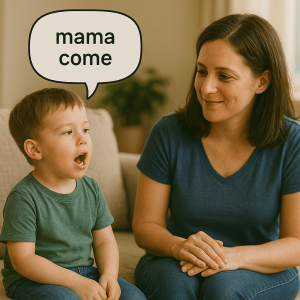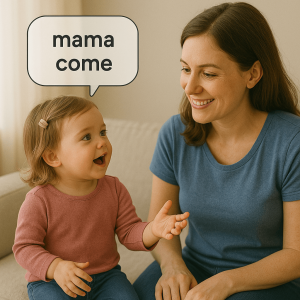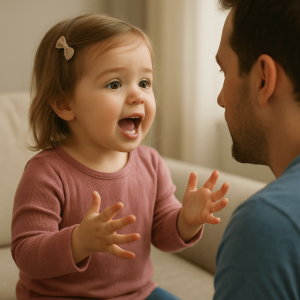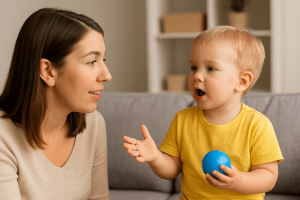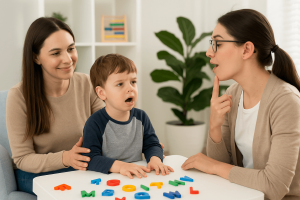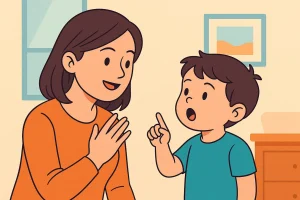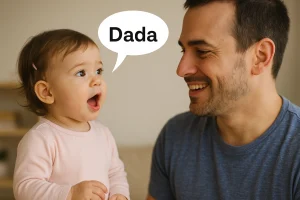Is My 3-4 Year Old Talking Enough? A Parent’s Guide to Milestones
By Wellness Hub
Last Updated: October 31, 2023
Are you wondering when your child has grown up so much that he already knows what to talk about, understands so much, and replies so well? Yes! The age of 3 to 4 years brings in significant developments in a child’s speech and language skills. During this period, children make significant strides in their abilities, such as cognition, communication, vocabulary, grammar, expressing thoughts and feelings, and understanding language nuances.
Development in Vocabulary
As children grow year by year, their observation and ability to learn things from their environment increases. They try to understand the meaning of new words used by the people around them and reuse them in their daily conversations.
Vocabulary expansion
By three years of age, children manage to learn around 1,000 words. During the period of reaching four years of age, their vocabulary would expand to 2,000 to 2,500 words. Children would start using words like “hot,” “cold,” “big,” and “small”.
Word combinations
By three years of age, children start combining two or three words to form sentences. By age 4, these sentences would contain 4 to 6 words. Children learn to use plurals and possessives more correctly than before.
Development in Grammar
Though they make grammatical mistakes and are not much aware of grammar rules, by the age 3, they form a basic idea of what is what. When they reach 4 years of age, the grammatical usage of verb tenses, sentence construction, and other crucial aspects are understood more clearly.
Structure of Sentence
The sentence construction of a 3-year-old will be as simple and short as possible. For example, they would say, “I need milk,” whereas a 4-year-old would build complex sentences. By age 4, they try to link their ideas to their expression of wants and needs by adding words like “but,” “and,” or “because.” They would say, “I need milk, but only in my cup.”
Verbs and pronouns
By three years of age, children start using pronouns correctly, like using “I,” “you,” “he,” “she,” or “it.” They also begin to grasp basic verb tenses, like past and present. By the age of 4, they become more proficient in using irregular past tense verbs.
| Receptive language | Expressive language |
| 1. Understands “how much?”. | 1. Identifies five primary colors and names |
| 2. Comprehends no to indicate non- existence | 2. Uses cant, do not, in, on, and plural markers. |
| 3. Understands contrast in 3rd person singular pronouns | 3. Has vocabulary of more than 1000 words and uses he, she, they. |
| 4. Comprehends 1st ordered embedded sentences: “Show the dog which is running.” | 4. Comprehends 1st ordered embedded sentences “show the dog which is running.” |
Communication skills
Communication skills improve in children as they progress through every year. Be it in their expressions or clarity in expressing, their social communication becomes more intelligible than before.
Expressive language
Your three-year-old would become increasingly expressive. As they grow, their expressions become vivid and in detail. By age 4, they can express their emotions more elaborately and can use apt words to narrate their experiences.
Storytelling
With the narrative skills they gain by age 3, they keep on improving as they enjoy telling stories and narrating incidents. Around four years of age, though not very coherent, they try to relate with sequencing events using descriptive language.
Question bank
Though they start asking questions from nearly 2.5 years of age, their questions become more substantial as they grow. Around four years of age, their questions become more sophisticated than before, reflecting a deeper understanding of the world around them.
Making conversations
At three years of age, children show interest in imitation play, parallel play, and engaging in simple conversations. By the time they reach age 4, these kids become capable of sustaining longer conversations, taking turns to speak, and staying on the topic.
| Receptive language | Expressive language |
| 1. Points out animals, objects, foods from a large group of other pictures | 1. Uses words predominantly. |
| 2. Comprehends simple present and future | 2. Uses 3 to 4 word sentence and is nonfluent. |
| 3. Comprehends demonstrative nouns this, that, there, etc | 3. Identifies all major colors and names. |
| 2. Uses 3 to 4-word sentences and is nonfluent. | 4. Comprehend comparison sentences. |
Speech sounds and Pronunciations
The speech sound development shows how they are trying to vocalize their opinions more clearly than before. By age 4, their talks are fully understood by a stranger without missing clarity.
Development of speech sound
Your 3-year-old might still have some issues with pronouncing certain speech sounds like “th” or “ra”. But at the age of 4, they outgrow these issues and will be able to produce the speech sounds correctly and pronounce new words explicitly.
Stammering
Some children face the symptoms of stammering or stuttering around 2 to 4 years of age. In most cases, it gets resolved on its own. If otherwise, early intervention by a speech therapist or speech and language pathologist helps.
Understanding language
Kids around four years old understand the language better than a 3-year-old one. They will be able to differentiate the subtle differences between similar words.
Following directions
By 3 years of age, your kid would understand simple one-step directions. But by age 4, they will be able to understand and follow complex multi-step instructions.
Understanding concepts
Children of this age can understand concepts such as shape, size, color, and spatial relationships. They can also differentiate between simple time concepts such as morning, afternoon, evening, and night.
Social language skills
By age 3, social skills like greeting, smiling, and initiating conversations are already part of the routine. Social language skills like having peer interactions and imitating adults while speaking to others are learned during this age.
Peer interactions
While having peer interactions, children after three years of age mostly stand, walk, talk, and use language like their elders, who are their role models at home. Around four years of age, you can find them showing interest in talking to their peers, sharing things, turn-taking, and using polite phrases like “please” and “thank you”.
Imitation skills
Imitation is also a skill which is developed very well after three years of age. Around 3 to 4 years old, they try to imitate their elders in every way they can. They absorb the intonations, gestures, and speech skills of their role models at home and imitate them during their conversations. These imitation skills are an essential part of the learning process.
As they transition from three years to four years of age, children develop many speech and language skills, including vocabulary, grammar, communication skills, speech sounds, understanding language and using at the right place, and social language skills. As each child is unique, there can be considerable variations in their development too. The above provided are general guidelines for speech and language milestones. Regular interactions with caregivers and peers, participating in social events and occasions, and exposure to a language-rich environment can foster language development in kids.
In case you feel that there is some delay in the speech and language developmental milestones of your child, early intervention helps. It is always recommended to take the suggestions of a speech and language pathologist to identify the issue and implement a necessary evidence-based plan of action based on technical assessments. Wellness Hub has a group of such speech therapists who can offer online speech therapy for children with all kinds of speech issues. Our Speech Basics app is a learning app for children fostering their speech and language development. You can also book a free speech consultation to rule out any possibilities of speech issues if unnecessary doubts are bothering you.
Book your Free Consultation Today
Parent/Caregiver Info:
Client’s Details:
* Error Message
